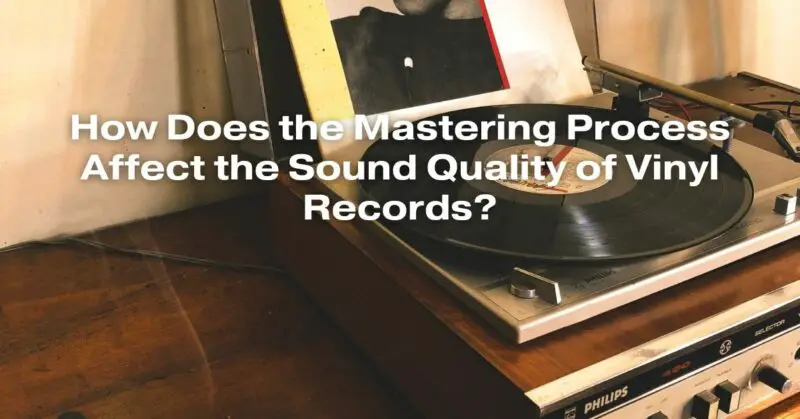In the world of audio engineering, the mastering process plays a pivotal role in shaping the final sound of any music recording. When it comes to vinyl records, this process becomes even more critical. Vinyl records have experienced a resurgence in popularity in recent years, with audiophiles and music enthusiasts appreciating the warm, authentic sound they offer. In this article, we will delve into the intricate process of vinyl mastering and explore how it significantly impacts the sound quality of vinyl records.
Understanding Vinyl Mastering
Vinyl mastering is the final step in audio production before a record is manufactured. It involves a skilled audio engineer fine-tuning the audio to ensure that it translates well to the physical medium of vinyl. Unlike digital formats, vinyl records have limitations in terms of frequency range, dynamic range, and overall sound quality. Mastering engineers must carefully consider these limitations to optimize the audio for vinyl playback.
Frequency Range and Vinyl Records
One of the primary challenges in vinyl mastering is the limited frequency range. Vinyl records cannot reproduce extremely low or high frequencies as accurately as digital formats. Mastering engineers need to identify and attenuate these frequencies to prevent distortion during playback. Additionally, excessive low frequencies can cause the needle to jump out of the groove, disrupting the listening experience.
Dynamic Range and Vinyl Records
Vinyl records also have limitations in dynamic range compared to digital formats. Excessive dynamic range in a recording can lead to wide groove excursions, potentially causing adjacent grooves to interfere with each other. This interference, known as groove crosstalk, can result in distorted sound. Mastering engineers use various techniques such as dynamic range compression and equalization to balance the audio and prevent these issues.
The Importance of Balance and Equalization
Achieving the right balance in the audio is crucial for vinyl mastering. Mastering engineers use equalization to adjust the tonal balance, ensuring that all elements of the music are represented accurately. This process involves tweaking the levels of bass, midrange, and treble frequencies to create a cohesive and balanced sound. Proper equalization is essential for preventing issues like inner groove distortion, where the high frequencies can become distorted as the needle approaches the center of the record.
Surface Noise and Vinyl Mastering
Vinyl records are susceptible to surface noise caused by imperfections on the surface of the record and dust particles. During mastering, engineers employ noise reduction techniques to minimize surface noise without compromising the overall audio quality. This delicate balance is crucial to preserving the clarity and fidelity of the music.
Conclusion
The mastering process significantly influences the sound quality of vinyl records. Skilled mastering engineers understand the nuances of vinyl and employ various techniques to optimize the audio for this unique medium. By carefully addressing the limitations of frequency range, dynamic range, and surface noise, engineers can ensure that the final vinyl record delivers a high-quality listening experience. As vinyl continues to captivate music enthusiasts, the art and science of vinyl mastering remain essential in preserving the rich tradition of analog audio in the modern era.


